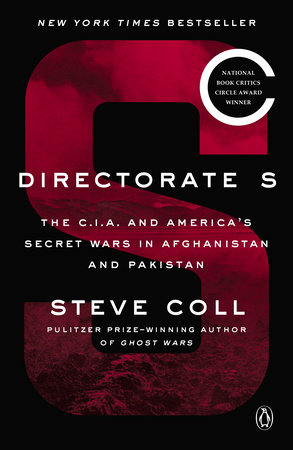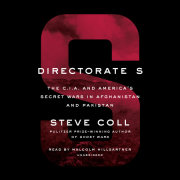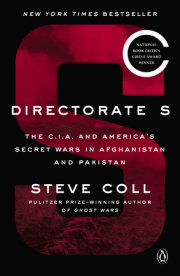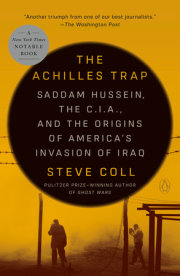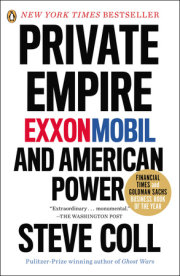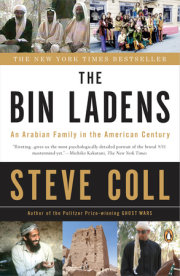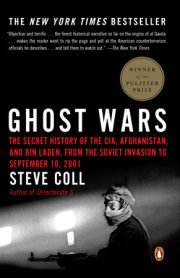One
"Something Has Happened to Khalid"
In the late summer of 2001, Amrullah Saleh flew to Frankfurt, Germany, to meet a man he knew as Phil, a C.I.A. officer. Saleh handled intelligence liaisons, among other tasks, for Ahmad Shah Massoud, the legendary Afghan guerrilla commander, who was then holding out against the Taliban and Al Qaeda from a shrinking haven in the northeast of his country. At twenty-eight, Saleh had a stern, serious demeanor; he was clean-shaven and kept his dark hair cropped short. He spoke English well, but deliberately, in a sonorous accent.
Saleh typically met his C.I.A. handlers at a hotel. He and Phil discussed a cache of spy gear the C.I.A. had organized for Massoud. The delivery included communications equipment and night-vision goggles that would allow Massoud's intelligence collectors on the front lines to better watch and eavesdrop on Taliban and Al Qaeda fighters. The C.I.A. had been training and equipping Massoud's intelligence directorate for several years, but the program was limited in scope. Under the policies of the Clinton administration and more recently the George W. Bush administration, the C.I.A. could not provide weapons to support Massoud's war of resistance against the Taliban. The agency could only provide Massoud nonlethal equipment that might aid the agency's hunt for Osama Bin Laden, the fugitive emir of Al Qaeda, who moved elusively around Taliban-ruled areas of Afghanistan. One shipment had included a giant, remote-controlled telescope. At another point the C.I.A. considered supplying Massoud with a balloon fixed with cameras to spy on Al Qaeda camps, but between Afghanistan's heavy winds and the possibility that neighboring China might misinterpret the dirigible, they decided against it.
Frankfurt was a logistics hub. The C.I.A.'s supply lines for Massoud were jerry-rigged and constrained by caution at headquarters. By early 2001, Langley had ordered C.I.A. officers to stop flying in Massoud's helicopters because they weren't judged to be safe enough. Phil and his colleagues usually delivered equipment directly to Dushanbe, where Saleh ran an office for Massoud. Tajikistan was recovering from a bloody civil war and there was occasional political unrest in the capital. That could make it difficult for C.I.A. officers to travel there but for the most part they found a way. Once in a while, however, they had to ask Saleh to pick up equipment in Germany and carry it the rest of the way himself. The C.I.A. officers involved knew the German government was highly sensitive about anything the agency did on German territory without informing the B.N.D., the principal German intelligence agency. But the supplies to Massoud were uniformly nonlethal; some of the equipment might skirt the borders of export licensing rules, but it was not obviously illegal, as arms and ammunition would be. Massoud's lieutenants were experienced smugglers. Sometimes Saleh would have to figure out how to transport C.I.A. equipment on his own.
This made Saleh nervous. He did not relish answering the questions of German police or customs officers at Frankfurt Airport. Where did you buy this? He would have no answer. Do you have any receipts? No. What will you use these night-vision goggles for? It would be unwise to mention the Afghan war. How did you obtain the funds to buy a $5,000 satellite phone and subscription?
Saleh had become an intelligence specialist only recently, but he was an avid student of the profession. In 1999, Massoud had selected him and eight other senior aides and commanders to travel to the United States to attend a C.I.A. training course put on by the Counterterrorist Center under strict secrecy rules; few people outside the center knew about it. The curriculum partly covered the arts of intelligence-identifying and assessing sources, recruitment, technical collection, analysis, and report writing. The paramilitary courses covered assessing targets, manuevering and communicating in the field, and so on. In Nevada, the trainees climbed a mountain with a telescope to practice reconnaissance operations in conditions that replicated those in Afghanistan. The training reflected the C.I.A. Counterterrorist Center's hope-a quixotic one, in the view of many agency analysts familiar with Afghanistan-that Massoud's guerrillas might someday locate and trap Bin Laden, even though the Al Qaeda leader rarely traveled to the north of the country, where Massoud's guerrillas were.
At the C.I.A.'s school, Saleh was a bit bored by the paramilitary instruction. He was more drawn to the craft of intelligence collection. He wanted a fuller understanding about intelligence systems and methods. He peppered the C.I.A. officers on the faculty with questions. He found a few who were willing to give him extra time and he tried to understand how the C.I.A. worked. When the course was over, Saleh went to Borders to buy a stack of books about spy services and intelligence history. Since then, he had earned respect at the C.I.A. The officers with whom he worked assessed Saleh as tough, disciplined, honest, and professional, if also a bit young to command authority in Afghan society, which venerated aged and experience.
To solve his shipping problems in Germany, Saleh tried to draw on his self-education, particularly concerning the methods of Israeli intelligence. Mossad had networks of helpers around the world-not just employees and paid agents or informers, but friends of the service who could be called upon for ad hoc favors. Saleh telephoned an Afghan-German businessman in Frankfurt whom he had cultivated for such assistance.
"I have something I need you to do-I need your help," Saleh said. The man suggested they meet at a hotel.
"I won't lie," Saleh said when they were settled. "It's equipment. If I'm lucky, I can take it out of Frankfurt Airport. If I'm unlucky, they will confiscate it." The gear was not lethal, Saleh added, but it did constitute "war equipment."
"Brother, I had offered to help you-but not in smuggling," the businessman said.
"This is not smuggling," Saleh pleaded. "It's all plastic, there's no explosives, nothing. There are some goggles."
Still, the man declined. He wished Saleh luck.
Saleh transported the gear, which was about the size of a half sofa, to Frankfurt Airport. He booked himself on a flight to Tashkent, Uzbekistan, from where he would transfer to Dushanbe. This was typical of the struggle against the Taliban in which he and Massoud were engaged: They were fighting a D.I.Y. guerrilla war. Massoud and his men had resources; the commander and many of his top lieutenants kept bank accounts in London and elsewhere abroad, according to C.I.A. reporting, and Massoud was reported to control just over $60 million in London accounts. Yet they were effectively at war with the Taliban and Pakistan, a nuclear-armed state with a gross domestic product in 2001 of more than $70 billion.
At the Lufthansa counter Saleh filled out forms. Then he answered many questions about his equipment. Had the C.I.A. tipped off the Germans and had the Germans agreed to go easy? He never knew. After a long colloquy, Lufthansa demanded only a considerable sum of money, which it calculated based on the weight of Saleh's cargo.
Amrullah Saleh had grown up in Kabul in a poor family from the Panjshir Valley. He was the youngest of five brothers. At seven, he was orphaned. Like many Afghans who came of age during the Soviet occupation of the country during the 1980s, he knew political violence intimately. One of his brothers disappeared, executed by unknown parties. Another of his brothers, who was an air force officer, fell to an assassin in Kandahar. At twenty-two, Saleh joined MassoudÕs guerrillas in the Panjshir Valley. The Panjshir is a gorge that occasionally widens into a valley. It slices from the north of Kabul toward Tajikistan. A tight kin network of ethnic Tajiks inhabited the valley and scratched out livings as farmers, emerald miners, smugglers, and traders. By the time Saleh arrived the Soviets had withdrawn their combat forces from Afghanistan, leaving behind advisers to shore up an Afghan Communist regime headed by President Najibullah, a former secret police chief. The war between mujaheddin guerrillas and the Communist government in Kabul continued but, increasingly, the guerrillas fought among themselves. They anticipated victory and competed for its prospective spoils. Massoud was perhaps the most politically savvy faction leader, the one who followed precepts of successful guerrilla leaders throughout history. He was a brilliant battlefield tactician, but he was equally concerned with food supplies and security for his civilian followers and with his popular credibility.
Because Saleh was bright and had already taught himself English, Massoud's lieutenants sent him to Pakistan in 1992, on a course provided by the United Nations titled "Post-Conflict Reconstruction and Management." Saleh studied how to manage humanitarian operations, in the eventual service of northern Afghanistan. Gradually, Saleh became the youngest man in Massoud's circle of advisers.
In the mid-1990s he moved to Russia. He learned Russian and tried to evaluate the potential for a new partnership with Afghanistan's former tormentor. (Russia had fallen into political and economic chaos under President Boris Yeltsin and Saleh returned to the Panjshir unconvinced that the Russian government could provide much help.) Later, Massoud dispatched Saleh to attend peace negotiations with the Taliban, sponsored by the United Nations. And Saleh began to work with the C.I.A.
The main C.I.A. unit tasked to interact with Massoud's guerrillas was called ALEC Station. Its mission was to capture or disrupt Osama Bin Laden and other Al Qaeda leaders. The station comprised about twenty-five operations officers and analysts, and it was based at C.I.A. headquarters in Langley, Virginia. Richard Blee, an experienced operations officer from the Africa Division of the clandestine service, took charge of ALEC in 1999. He inherited a group under rising pressure. After Al Qaeda bombed American embassies in Africa in 1998, C.I.A. officers working with foreign intelligence services from Egypt to Jordan to Kenya to Pakistan conducted raids on the homes of suspected Al Qaeda members and associates around the world. They seized computer drives and documents in Arabic, Urdu, English, and other languages and then dumped the materials on ALEC Station, to be sifted line by line for clues and names that might help to thwart upcoming terrorist attacks. By 2001, the station's analysts transmitted an average of twenty-three formal reports per month to the F.B.I. about Al Qaeda. The work combined high stakes with numbing detail. Senior officers found that if they did not work from 7:00 a.m. until 6:00 p.m. or later Monday through Friday, plus a few hours on Saturday and Sunday, they could not keep up with the traffic.
Blee had served multiple tours working the streets in unstable capitals. His C.I.A. tours had included postings to Bangui, the capital of Central African Republic; Niamey, the capital of Niger; Lagos, Nigeria; and Algiers. Blee was tall, with sandy hair. Some of his colleagues found him aloof and entitled. He was a second-generation C.I.A. officer, pegged by some to rise high in the agency, eventually. He was cerebral and well informed about international affairs, comfortable working in ambiguous conflict zones. Considering the problem of Al Qaeda's sanctuary in Afghanistan, a landlocked nation where the United States had no embassy, Blee strongly favored working through Ahmad Shah Massoud, the most effective Afghan commander on the ground who shared the C.I.A.'s antipathy toward Bin Laden.
Blee had led a covert team of C.I.A. counterterrorism officers who flew into the Panjshir to meet Massoud in October 1999. "We have a common enemy," Blee had told the commander. "Let's work together." He and C.I.A. officers who followed provided power supplies for Massoud's intelligence equipment, better intercept gear, and an encrypted communications link that connected Massoud's intelligence aides to ALEC Station, to send and receive secure typed messages. There was one encrypted terminal in Dushanbe and a second in the Panjshir. Massoud assigned Amrullah Saleh to be Blee's main contact.
The following year, Al Qaeda suicide bombers supported from Afghanistan struck an American warship, the USS Cole, in the Yemeni port of Aden, killing seventeen American sailors. After that, in December 2000, Blee had drafted plans at the request of the expiring Clinton White House for a $150 million covert action program to arm, equip, and train Massoud for missions beyond the Bin Laden hunt, to help him fight the Taliban more effectively. Yet many American and European intelligence officers, generals, and diplomats did not see Massoud as a viable partner against Al Qaeda. Recalling the miserable fates of imperial Britain and the Soviet Union, they did not want to entangle the United States in Afghanistan's civil war. The Panjshiris had committed mass killings during a period when they shared power in Kabul during the mid-1990s. They continued to smuggle gems and heroin, to fund their war. Massoud's warnings about Al Qaeda could be dismissed as an element of a self-interested diplomatic campaign to win international aid for his losing factional struggle.
Blee became one of Massoud's most ardent defenders in Washington, regarding the commander as a great historical figure, comparable to Che Guevara. Massoud's wispy beard had grown gray and dark bags hung beneath his eyes, but he remained highly energetic on the battlefield. Massoud's argument was that the United States had a "huge problem" in Afghanistan, much bigger than Bin Laden. The essence of Massoud's message was: "You've got all of these extremists. You've got the Taliban. And I'm the only friend you've got in this neighborhood."
Blee agreed with Massoud entirely but he could not win the foreign policy argument in Washington. He told Massoud, "Look, nobody gives a damn about Afghanistan. They care about Bin Laden. I can't talk to you about taking over the government of Afghanistan. I'm only empowered to talk to you about getting Bin Laden. But we can build on that. Who knows where that goes?" Massoud understood. All of his allies and foreign suppliers were constrained in one way or another.
ALEC Station ran some of its covert operations against Al Qaeda, including Predator drone surveillance flights, from the C.I.A. station in Tashkent, Uzbekistan. Amrullah Saleh worked with officers there as well as those in Virginia. That summer of 2001, amid the frustration over America's hesitancy to back Massoud fully, Saleh fell into conversation with one of Rich Blee's colleagues, Jim Lewis, a Counterterrorist Center case officer posted to Tashkent. Lewis urged Saleh to watch The Siege, a 1998 movie about terrorism written by the journalist and author Lawrence Wright and starring Denzel Washington and Bruce Willis. In the film, a terrorist group carries out bombings inside the United States and the government imposes martial law. Lewis predicted, "Something similar to that will happen to my country. But nobody is listening to us."
From Frankfurt, Saleh returned to Dushanbe. He met Massoud there on Friday, September 7. Massoud had arrived to speak with a visiting Iranian delegation. In the absence of more robust American support, Massoud depended on Iran, India, and Russia for weapons, money, and medical aid. Iran was perhaps his most reliable ally. Iranian Revolutionary Guards and intelligence operatives worked in northern Afghanistan alongside Massoud's guerrillas.
Copyright © 2018 by Steve Coll. All rights reserved. No part of this excerpt may be reproduced or reprinted without permission in writing from the publisher.

